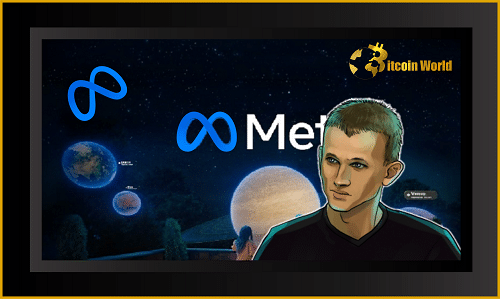Ever wondered what the brilliant mind behind Ethereum thinks about the metaverse? Well, if you’re picturing Mark Zuckerberg’s vision, you might be surprised. Vitalik Buterin, a key figure in the crypto world, has voiced his skepticism about the current corporate attempts to build the metaverse, particularly Meta’s endeavors. Let’s dive into why he believes it’s still too early to define the metaverse and why existing attempts might just ‘misfire’.
Vitalik’s Metaverse Take: Too Soon to Tell?
In a candid tweet responding to Dialectic co-founder Dean Eigenmann, Buterin didn’t hold back. He believes that while the metaverse is undoubtedly on the horizon, the way some corporations are approaching it is premature. He pointed out a fundamental issue: we’re still figuring out what people truly want from this digital frontier. Think of it like trying to build a house without knowing how many rooms are needed or what style the occupants prefer. According to Vitalik:
- The metaverse is inevitable.
- Current corporate attempts might not hit the target.
- We lack a clear definition of ‘the metaverse’.
- It’s too early to understand user desires.
- Therefore, Meta’s current approach might be misguided.
This perspective highlights a crucial point: the metaverse isn’t just about fancy VR headsets; it’s about understanding and catering to the evolving needs of its users. Some critics even argue that Meta’s centralized approach contradicts the core principles of decentralization that many in the crypto space champion.
What Exactly is Facebook Meta Trying to Build?
So, what’s the blueprint for Meta’s metaverse? Imagine a persistent, shared virtual world that you can access using technologies like augmented reality (AR), virtual reality (VR), and even cryptocurrencies. Meta envisions this space as a future where people can connect, work, and play in immersive digital environments over the next 10 to 15 years. Think of it as a digital extension of our physical world.
Key aspects of Meta’s vision include:
- A virtual world for connection and interaction.
- Integration of AR, VR, and potentially cryptocurrency.
- A self-contained, immersive user experience.
Meta has already been developing tools to bring this vision to life, such as Meta Horizons Workrooms, a VR workspace designed for team collaboration and idea sharing. They’re also exploring smart glasses that can overlay digital information onto the real world, offering a glimpse into this interconnected future.
Are There Successful Metaverse Projects Already?
Despite the skepticism surrounding centralized corporate endeavors, the metaverse concept is already gaining traction in other areas. Projects built on blockchain technology are demonstrating the potential of decentralized virtual worlds. Think of platforms like The Sandbox and Decentraland, where users have true ownership of their digital assets.
Let’s take a quick look at some successful examples:
| Project | Key Features |
|---|---|
| Gala Games | Blockchain-based gaming platform with player ownership. |
| Axie Infinity | Play-to-earn game where players own and trade digital creatures (Axies). |
| Decentraland | Virtual world where users can buy, sell, and develop virtual land. |
| The Sandbox | User-generated content platform where players can create and monetize experiences. |
These projects highlight the appeal of decentralized ownership and control within the metaverse. Furthermore, recognizing the importance of interoperability, various metaverse developers have formed the Open Metaverse Alliance (OMA3). This alliance aims to foster a more inclusive, decentralized, and democratized metaverse, ensuring different virtual worlds can connect and interact seamlessly.
What Does the Future Hold for the Metaverse?
The momentum behind the metaverse is undeniable. Even with Vitalik’s reservations about current corporate attempts, the sheer number of major players investing in this space suggests a significant shift is underway. The Metaverse Standards Forum (MSF) boasts over 35 tech giants, including Meta, Microsoft, Nvidia, Alibaba, Unity, and Sony, all working towards establishing common standards and interoperability within the metaverse. This collaboration could be crucial in shaping a more open and connected virtual future.
Key Takeaways on Vitalik, Meta, and the Metaverse:
- Early Stages: Vitalik believes it’s too early to definitively shape the metaverse.
- User Needs: Understanding user desires is paramount for successful metaverse development.
- Decentralization Debate: Critics question if centralized corporate control aligns with the metaverse’s potential.
- Successful Examples Exist: Decentralized projects like The Sandbox and Decentraland are gaining traction.
- Collaboration is Key: Initiatives like OMA3 and MSF aim for a more open and interoperable metaverse.
In conclusion, while the vision of a fully realized metaverse is still unfolding, Vitalik Buterin’s perspective serves as a valuable reminder that understanding user needs and embracing decentralization could be crucial for its success. Whether Meta’s current approach will ultimately resonate with users remains to be seen, but the ongoing innovation and diverse approaches within the metaverse landscape promise an exciting and evolving digital future.
Disclaimer: The information provided is not trading advice, Bitcoinworld.co.in holds no liability for any investments made based on the information provided on this page. We strongly recommend independent research and/or consultation with a qualified professional before making any investment decisions.




